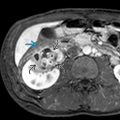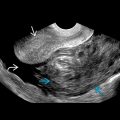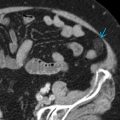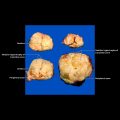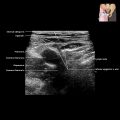KEY FACTS
Terminology
- •
Testicular microlithiasis (TML): Presence of 5 or more microliths or microcalcifications in whole testis or 5 or more microliths per field of view
- •
Limited TML: Presence of < 5 microcalcifications per field of view
- •
Microcalcifications composed of hydroxyapatite, located within spermatic tubules
Imaging
- •
On US, seen as discrete, punctate, nonshadowing echogenic foci scattered within testicular parenchyma
- •
Majority are idiopathic; previous infection or trauma may also be responsible
- •
Clusters of microliths may represent testicular tumors even when no soft tissue mass can be identified
- •
Adjacent hypoechoic foci, if seen, could represent neoplasia
- •
May occasionally see comet-tail artifact
- •
High-resolution US (≥ 7.5 MHz) is modality of choice
- •
May occasionally see twinkling artifact on color Doppler
Top Differential Diagnoses
- •
Scrotal pearls (scrotoliths)
- •
Large-cell calcifying Sertoli cell tumor
- •
Testicular granuloma
Pathology
- •
Testicular neoplasia in 18-75%, intratubular germ cell neoplasia, germ cell version of carcinoma in situ
Clinical Issues
- •
Microlithiasis in absence of other risk factors is not indication for further sonographic screening or biopsy
- •
Follow-up US recommended in patients with risk factors, including personal/family history of GCT, maldescent or undescended testes, orchidopexy, testicular atrophy
Diagnostic Checklist
- •
If TML is seen, check bilateral testes carefully for any focal solid lesion
- •
Once germ cell tumor has been excluded, risk of cancer is very low unless risk factors present
Scanning Tips
- •
If TML is seen, check bilateral testes carefully for any focal solid lesion
- •
Scan carefully from medial to lateral in longitudinal plane and superior to inferior in transverse plane to detect limited TML


